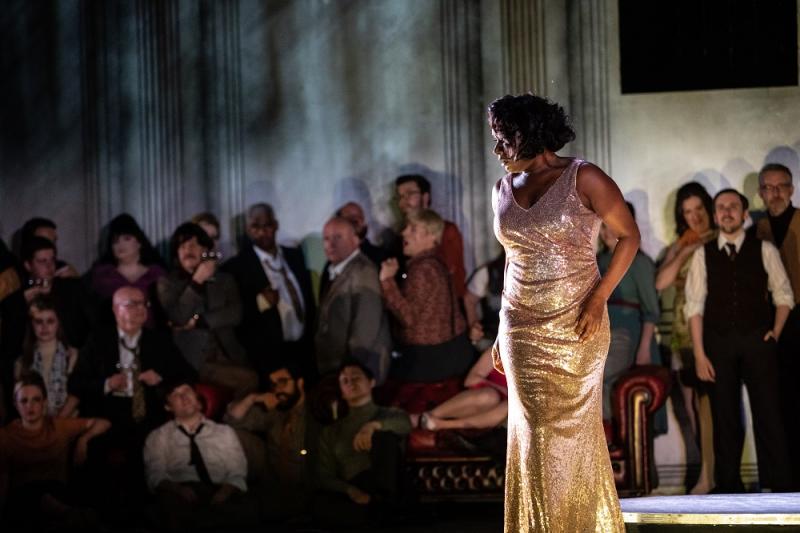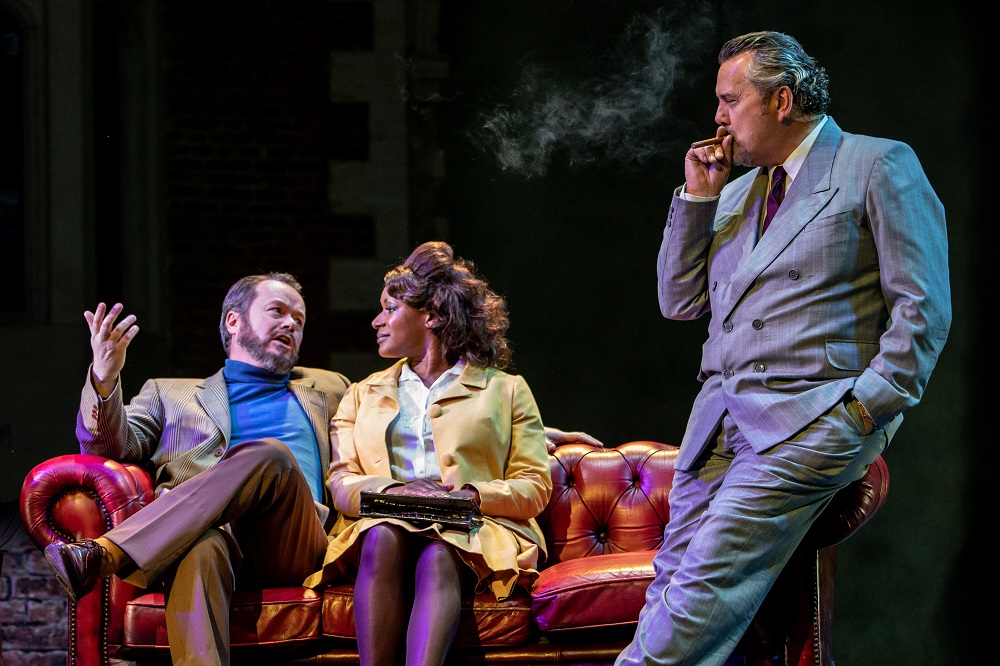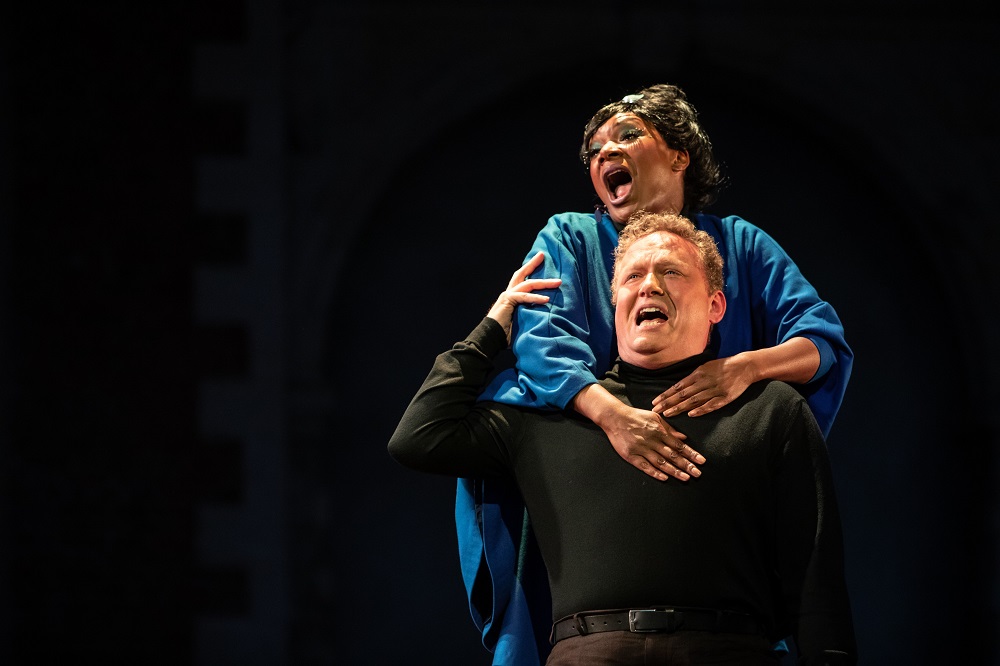Manon Lescaut, Opera Holland Park review - attempt to empower commodified woman falls flat | reviews, news & interviews
Manon Lescaut, Opera Holland Park review - attempt to empower commodified woman falls flat
Manon Lescaut, Opera Holland Park review - attempt to empower commodified woman falls flat
Star quality from Elizabeth Llewellyn doesn't quite lift this dramatically inert evening

"Waiting is always wearisome," declare the socialites as glitter-and-be-gay Manon Lescaut receives in the home of her nasty old "protector" Geronte. Despite the numerous sugar-plums Puccini weaves into his first fluent operatic masterpiece, waiting is very wearisome in the first half of Karolina Sofulak's new production for Opera Holland Park.
Sofulak gives us neither the 18th-century powder and paint of the Abbé Prévost novel upon which Puccini and the more effete Massenet based their operas nor the "desperate passion" Puccini vowed as his trump card (and succeeded), at least not in the acting. There are only three settings: the 1960s club/bar which makes a poor substitute for the hustle and bustle of a square in Amiens, Geronte's love-nest and an endgame with a brick wall and a lamp-post: no shipping off to America for the fallen woman - probably wouldn't work in the setting - nor death in the desert plain improbably located beyond New Orleans.  The cabined and confined crowd in Act 1 get to do some desultory moves as Tim Claydon's choreography injects a bit of belated life into the (in)action, but there's none of the youthful vivacity radiating from the orchestral handling of Puccini's score. Co-ordination wasn't strong on the first night; Robinson tends to keep his head down, most often in the score, and doesn't provide the ideal high beat for the singers. Star quality comes at last with the elegant and slightly sphinx-like presence of Llewellyn's Manon, and a bit of moonshine in her first meeting with Des Grieux; Auty has the right Italianate sound, though the very top is now bottled. His desperation in the later stages is vocally convincing. Paul Carey Jones as Manon's creepy-energetic pimp-brother and Stephen Richardson as big-bucks Geronte (both pictured above with Llewellyn) bring the most to their characterisations.
The cabined and confined crowd in Act 1 get to do some desultory moves as Tim Claydon's choreography injects a bit of belated life into the (in)action, but there's none of the youthful vivacity radiating from the orchestral handling of Puccini's score. Co-ordination wasn't strong on the first night; Robinson tends to keep his head down, most often in the score, and doesn't provide the ideal high beat for the singers. Star quality comes at last with the elegant and slightly sphinx-like presence of Llewellyn's Manon, and a bit of moonshine in her first meeting with Des Grieux; Auty has the right Italianate sound, though the very top is now bottled. His desperation in the later stages is vocally convincing. Paul Carey Jones as Manon's creepy-energetic pimp-brother and Stephen Richardson as big-bucks Geronte (both pictured above with Llewellyn) bring the most to their characterisations.
There is no luxury, nor bling, for the rich man's house, only tatty furniture (OHP never has a big budget for design, but George Johnson-Leigh could have taken a leaf out of Antony McDonald's Ariadne auf Naxos at OHP last year and insisted on a classier dressing-table and bed; it doesn't take much). That elf outfit Manon chooses for couture may be authentically 60s, as far as I know, but it's the one piece of fashion which Llewellyn can't wear well. To have one camp stereotype for the fashion-shoot which substitutes for Manon's dancing lesson is otiose, even if we know that gay men were still forced into those roles in the 1960s; to give us five is enraging. The duet is a physical embarrassment, though vocally good: "come, embrace me, hold me close to your breast," sings Manon, but Auty's Des Grieux seems reluctant to come close (contact at last pictured below). Manon's arrest is lifeless on stage, though Robinson has certainly put the strings through their paces in the focus and fire of the final confusion.  With more spotlight on the music, Act 3 fares better: the Intermezzo glows, the ensemble in which nominally the prostitutes are lined up for export packs the biggest punch of the evening. Sofulak has the not bad idea of making them multiple Manons in glittering evening wear: still sold objects humiliated by the bar-room crowd gawking at them. The big feminist statement comes in Act 4. This Manon has simply had enough of men, Des Grieux included - and who wouldn't, since he only whines on about his terrible fate. There are some awkward misalliances between text and staging, but nothing wrong with the idea of Manon removing herself, not dying. It just isn't moving, though Llewellyn is perfectly poised and now in near-vintage voice. The trouble with what Sofulak calls in the programme a "meditation on female empowerment" is that, however you look at it, Puccini's and Prévost's heroine has no power at all. And that in itself can be disturbing. Here, alas, we're left unruffled.
With more spotlight on the music, Act 3 fares better: the Intermezzo glows, the ensemble in which nominally the prostitutes are lined up for export packs the biggest punch of the evening. Sofulak has the not bad idea of making them multiple Manons in glittering evening wear: still sold objects humiliated by the bar-room crowd gawking at them. The big feminist statement comes in Act 4. This Manon has simply had enough of men, Des Grieux included - and who wouldn't, since he only whines on about his terrible fate. There are some awkward misalliances between text and staging, but nothing wrong with the idea of Manon removing herself, not dying. It just isn't moving, though Llewellyn is perfectly poised and now in near-vintage voice. The trouble with what Sofulak calls in the programme a "meditation on female empowerment" is that, however you look at it, Puccini's and Prévost's heroine has no power at all. And that in itself can be disturbing. Here, alas, we're left unruffled.
The future of Arts Journalism
You can stop theartsdesk.com closing!
We urgently need financing to survive. Our fundraising drive has thus far raised £49,000 but we need to reach £100,000 or we will be forced to close. Please contribute here: https://gofund.me/c3f6033d
And if you can forward this information to anyone who might assist, we’d be grateful.

Subscribe to theartsdesk.com
Thank you for continuing to read our work on theartsdesk.com. For unlimited access to every article in its entirety, including our archive of more than 15,000 pieces, we're asking for £5 per month or £40 per year. We feel it's a very good deal, and hope you do too.
To take a subscription now simply click here.
And if you're looking for that extra gift for a friend or family member, why not treat them to a theartsdesk.com gift subscription?
more Opera
 Káťa Kabanová, Glyndebourne review - emotional concentration in a salle modulable
Janáček superbly done through or in spite of the symbolism
Káťa Kabanová, Glyndebourne review - emotional concentration in a salle modulable
Janáček superbly done through or in spite of the symbolism
 Buxton International Festival 2025 review - a lavish offering of smaller-scale work
Allison Cook stands out in a fascinating integrated double bill of Bernstein and Poulenc
Buxton International Festival 2025 review - a lavish offering of smaller-scale work
Allison Cook stands out in a fascinating integrated double bill of Bernstein and Poulenc
 Tosca, Clonter Opera review - beauty and integrity in miniature
Happy surprises and a convincing interpretation of Puccini for today
Tosca, Clonter Opera review - beauty and integrity in miniature
Happy surprises and a convincing interpretation of Puccini for today
 Hamlet, Buxton International Festival review - how to re-imagine re-imagined Shakespeare
Music comes first in very 19th century, very Romantic, very French operatic creation
Hamlet, Buxton International Festival review - how to re-imagine re-imagined Shakespeare
Music comes first in very 19th century, very Romantic, very French operatic creation
 Falstaff, Glyndebourne review - knockabout and nostalgia in postwar Windsor
A fat knight to remember, and snappy stagecraft, overcome some tedious waits
Falstaff, Glyndebourne review - knockabout and nostalgia in postwar Windsor
A fat knight to remember, and snappy stagecraft, overcome some tedious waits
 Salome, LSO, Pappano, Barbican review - a partnership in a million
Asmik Grigorian is vocal perfection in league with a great conductor and orchestra
Salome, LSO, Pappano, Barbican review - a partnership in a million
Asmik Grigorian is vocal perfection in league with a great conductor and orchestra
 Semele, Royal Opera review - unholy smoke
Style comes and goes in a justifiably dark treatment of Handelian myth
Semele, Royal Opera review - unholy smoke
Style comes and goes in a justifiably dark treatment of Handelian myth
 Le nozze di Figaro, Glyndebourne review - perceptive humanity in period setting
Mostly glorious cast, sharp ideas, fussy conducting
Le nozze di Figaro, Glyndebourne review - perceptive humanity in period setting
Mostly glorious cast, sharp ideas, fussy conducting
 Fidelio, Garsington Opera review - a battle of sunshine and shadows
Intimacy yields to spectacle as Beethoven's light of freedom triumphs
Fidelio, Garsington Opera review - a battle of sunshine and shadows
Intimacy yields to spectacle as Beethoven's light of freedom triumphs
 Dangerous Matter, RNCM, Manchester review - opera meets science in an 18th century tale
Big doses of history and didaction are injected into 50 minutes of music theatre
Dangerous Matter, RNCM, Manchester review - opera meets science in an 18th century tale
Big doses of history and didaction are injected into 50 minutes of music theatre
 Mazeppa, Grange Park Opera review - a gripping reassessment
Unbalanced drama with a powerful core, uninhibitedly staged
Mazeppa, Grange Park Opera review - a gripping reassessment
Unbalanced drama with a powerful core, uninhibitedly staged
 Saul, Glyndebourne review - playful, visually ravishing descent into darkness
Ten years after it first opened Barrie Kosky's production still packs a hefty punch
Saul, Glyndebourne review - playful, visually ravishing descent into darkness
Ten years after it first opened Barrie Kosky's production still packs a hefty punch

Add comment